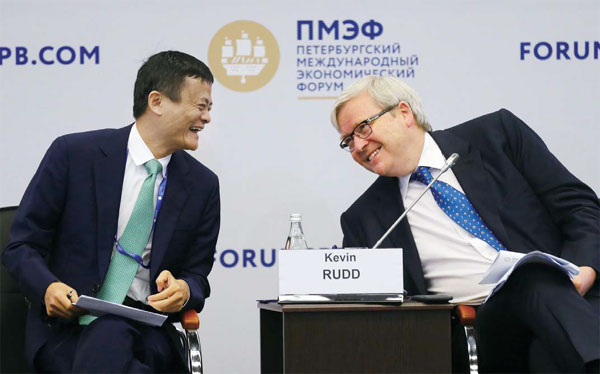Digital FTZ proposed for small businesses
Jack Ma, founder and chairman of e-commerce giant Alibaba Group Holding Ltd, has proposed digital free trade zones for small- and medium-sized enterprises and called on Russia to become an e-hub intersection connecting Asia and Europe.
An e-hub is a digital FTZ designed specifically for small businesses that offer services in logistics, payments, financing and inspections.
"Trains have stations and aircraft have airports. We should build an e-road that connects e-hubs around the world. It would be a paradise for SMEs to sell products that serve anywhere in the world," Ma says, adding: "Russia has very good chance to be one of the e-hubs."
|
Jack Ma, chairman of Alibaba Group, talks with Kevin Rudd, president of the Asia Society Policy Institute and former Australian prime minister, at the St. Petersburg International Economic Forum that opened on June 16. Xu Jingxing / China Daily |
Ma was speaking on June 16 at the St. Petersburg International Economic Forum. The three-day annual event is dedicated to the most pressing economic and business issues facing Russia and the world.
Ma's proposal is part of his ambition to build the so-called Electronic World Trade Platform. It would serve the interests of SMEs left out of the world's free trade system.
"In most countries, SMEs contribute more than 50 percent of GDP and an even higher percentage of employment. But SMEs face challenges such as poor access to global markets, complex regulations and certifications designed for big companies, and a lack of access to financing," the Alibaba chairman says.
"We urge G20 countries to support the growth of SMEs," adds Ma, who is also the chairman of the SME development taskforce for the B20, the business advisory group to the G20.
Cross-border shopping is the fastest-growing sector in Russia's e-commerce market. Ma says last year that about one in 10 people from Russia make online purchases through Alibaba's AliExpress, a site that allows shoppers around the world to buy goods at wholesale prices.
Hundreds of thousands of packages are sent from China to Russia on a daily basis, according to the Chinese company.
China has been Russia's largest trading partner since 2010. However, Sino-Russian bilateral trade fell 27.8 percent last year to $64 billion due to the ongoing global economic downturn and falling oil prices, according to the General Administration of Customs.
"In addition to energy industry cooperation, companies from both countries should work together to jointly develop high-end products for the manufacturing, consumption and infrastructure sectors," says Chen Yuan, vice-chairman of the National Committee of the Chinese People's Political Consultative Conference, the top advisory body.
"Such a partnership will create huge opportunities for trade and financial cooperation. I'm confident bilateral trade reach $200 billion by 2020," Chen says.
Leaders of both countries first set the trade target in 2014.
Contact the writers through luhaoting@chinadaily.com.cn



















